Ahhh, Madame L! It’s good to hear from you again!
The voice on the line is warm, syrupy even. I’m making my introduction, reminding the doctor who I am after nine intervening months away from Antibes – and he’s telling me that I’m his favourite patient.
It’s cent pour cent the truth! He says. 100%!
I’m wondering what I’ve possibly done to merit such an accolade. Surely it’s the sociable dinners and top wines that our families have shared now and again over the years that has elevated my status in his patient roster. What’s more, I realize our local family doctor is addressing me in English. Mostly English anyway. For years he pressed me to work on my French, completely withholding his fairly fluent English at first so I couldn’t slip into my native tongue in describing whatever ailment had brought me to see him.
Wow! Well, merci, merci, I say. But I’m keen to move the conversation on. Our good doctor employs no receptionist – not an uncommon situation for single-person cabinets in France – and he could well have a patient sitting in the straight-backed chair across from his desk. I’ve sat there myself in the past, so I’m ready to get straight to the point.
How was the winter in Canada? he instead asks.
The French are obsessed by the idea of Canadian winters. If it’s not our doctor asking, it’s the server at the local boulangerie, the head of the estate agency, the gardener – basically everyone we’ve rediscovered here this summer.
Très froid, I say, très difficile, somehow unable to rid myself of the previously imposed French. I know these words are exactly what locals are hoping to hear. That our winter was hardly a piece of cake – far worse than usual actually – only proves, despite the economic climate, how wise people are to stay year-round in the Côte d’Azur.
Finally I launch in, aware that the presumed patient there in the doctor’s chair could shortly be me. We’re travelling en Afrique in a couple weeks, I say, and I need a prescription for malaria tablets for Lolo and me. Maybe a prescription for just-in-case anti-diarrhea antibiotics, too – the special stuff beyond the over-the-counter meds that you take to places like Africa should things get really rough. (Philippe, I should say, never worries about such details. When he travels he thinks he’s Indiana Jones – and then he’s the first one cracking the family medicine kit.)
My agenda lays open in front of me, ready to fix an appointment.
Instead the doctor starts in on specifics. Where are you going exactly? When and how long? As our telephone conversation continues, I imagine the other patient seated across from him waiting, annoyed, bowing now to inspect his fingernails.
The full range of our doctor-patient consultation is taking place on the telephone. Within the minute we’ve reviewed the necessary antibiotics, even if the doc specifies half the usual dosage for malaria.
Just head over to the pharmacie, his warm voice assures me, and you’ll get whatever you need. Tell them I sent you. If you have any problems, let me know.
With that, the discussion ends. Before ringing off, though, we’re outlining our families’ summer travel schedules and fixing up a date.
If only all medical consultations were so effortless! Last year, before heading to developing parts of Asia, Lolo and I had separate, formally scheduled appointments with travel specialists in Toronto. (Indiana Jones, of course, didn’t need any assistance.) We left each appointment charged with sheaves of informative papers and official prescriptions with exacting dosages, usages and side effects of anti-malarial and anti-diarrhea drugs. Things were hardly so cozy in Canada.
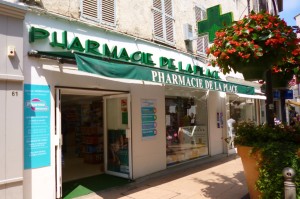
Neither are the French pharmacies that fill these antibiotic prescriptions anything like those in the Anglophone world. They aren’t Walgreens or Shoppers Drug Mart or Boots, vaulting box stores where you stroll the aisles with ample shopping carts and peruse the shelves at leisure. In Canada, the US and Britain, you can twist caps off gels and lotions and sniff for the best fragrances. You can loiter in the aisles comparing the active ingredients in Advil and Tylenol and Sudafed, reading every smidgeon of fine print on every box if you’re so inclined without a soul approaching you. And if you do have a question, you can cruise the store’s long, anonymous aisles for hours on end with your cart click-clicketying along while you hope to happen upon a member of staff who might give you the time of day.
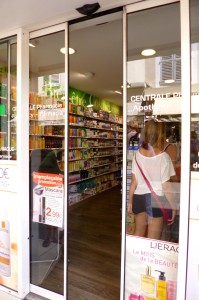
Not so in France. No, each French pharmacie is special. Hardly a member of a sterile, international chain – pharmaceutical chains aren’t allowed in the country, after all – each shop is a perfect little jewel, wrapped up with sliding glass doors and tied with a bright green, flickering neon cross outside that announces this establishment is an authentic, French pharmaceutical institution. The insides are usually brightly lit and small in size. Bottles and boxes line the shelves, neatly organized by function and brand name, and often in the precious quantities that befit any organization of distinction and luxury.
Along the far wall of the pharmacie, you find a white-coated pharmacist hovering behind the counter, guarding the back wall of colourful medicine boxes. Only a pharmacist, or a group of pharmacists, is allowed to own a pharmacie in France, so in entering the shop you are, by definition, walking on his terrain. You need to consult the pharmacist, or an assistant, in order to purchase any drugs – from simple aspirin on up the food chain. No box, non-prescription or otherwise, inhabits any shelf that’s directly accessible to customers.
In the past I preferred to skip these typical pharmacies and head to a large, very unFrench-sounding store in the center of Antibes called Schlecker. Here I could push my shopping cart unacknowledged through long-ish aisles and choose the usual pharmacy products myself. Or so I thought, anyway, until one day I needed a bottle of Advil. Schlecker didn’t sell Advil, or anything like it. The only spot allowed to sell OTC drugs in France is the fully-fledged, green-cross-toting pharmacie.
(These days, poof, Antibes’ Schlecker store is gone. In its space has gone up a shop called Utile (which means “useful”), a basic grocery store in close proximity to two other grocery stores. I do not find the change at all utile.)
So now I simply bring the basic, OTC medicines from Canada – things you often have around the house anyway for aches or colds. Even with passing years, I’m still not fond of that air of intimidation in French pharmacies – some off-putting combination of hoity-toity brands and the need to enter the shop with a solid purpose. And I really have no desire to be duped by what I reckon (from adverts anyway) is a key sales focus: magic potions that natives rub on their bodies to fix every conceivable corporal ill, from fine hair to dark spots to stubborn cellulite.
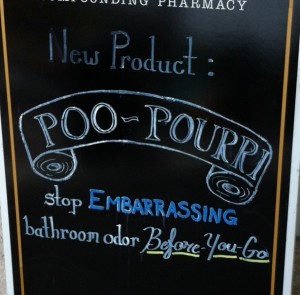
Okay, that wasn’t meant to sound so harsh. To make peace, here’s a sign I saw outside a Toronto compounding pharmacy a couple months ago: Poo-pouri – Stop embarrassing bathroom odor before you go. Insanity is a global problem.
But last summer’s run-in continues to put me off. I popped out to the pharmacie – the local one where our good doc has sent me again today – to collect a few ordinary items and to fill a (verbal) prescription for Lolo. Combing the neat shelves and spinning racks, I couldn’t find a single nail file or packet of dental floss. I stumbled on a special foot cream that looked interesting (oh, was I succumbing?) but put the tube back on its careful display as I refused to pay, what, $18 . . . at which point a white-haired man in a blue-checked shirt stared down at me with eagle eyes and asked if he could help.
J’ai une question pour le pharmacien, I told him, feeling almost guilty for loitering. I pointed toward the back counter where I was heading to join the queue.
Oui? he said.
What – did he want me to ask him the question? Who did he think he was? And who did he think I was – a shoplifter or something? What’s wrong with the idea of browsing at will?
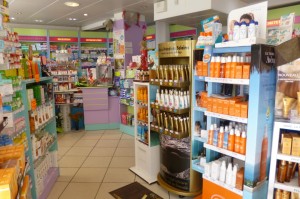
The white-haired man interrogated me over my verbal prescription, asking for Lolo’s exact symptoms, questioning the unnecessary strength of the potions I thought I required and whether the doctor giving the prescriptions actually had seen my daughter. (Non, he hadn’t in this case either.) The credentials of the white-haired man in the blue-checked shirt somehow allowed him behind the all-important pharmaceutical counter to retrieve Lolo’s medications. In fact, I realized, he was quite possibly the pharmacien himself.
Today again, I have reason to head to the same pharmacie up the road. My prescriptions again are verbal ones. I enter the sliding glass doors and hope for the best. With conviction I pick up a couple items on my list and walk directly to the counter at the back.
The white-haired pharmacien doesn’t appear to be in, but one of his assistants, a woman in her thirties, pleasantly asks how she can help. I explain my situation – the verbal prescriptions from the doctor up the road – with a combination of certitude and apology.
The assistant is happy to help. Boxes of anti-malarial tablets and the headier diarrhea antibiotics slide freely across the counter. Si vous en avez besoin – if Lolo or I need to take this diarrhea stuff – the directions are inside, she says.
And that’s it. No papers, signed and certified by the right people, cross the counter at the far end of the pharmacie. No notes are made on any personal computer files. And no one ever asks about prescription insurance. After generous government reimbursements, many drugs in France are close to free.
The assistant rings out my other items at the same time. On ne l’utilise pas chaque jour, she begins, holding up one box. I shouldn’t use it every day.
Her instructions continue as she slips the various items into a thin, plastic bag. Use this twice a week only. Apply it in the place of a your usual product. A small ball should do. . . . Her guidance is precise and exacting.
I listen, amused, to the earnestness in her voice. I find no need to take notes. I’ve used this stuff before. And anyway – good grief, have I succumbed? – it’s hardly the sort of prescription drug that can do a bunch of damage. The product she’s describing with such diligence is simply a tube of whitening toothpaste.

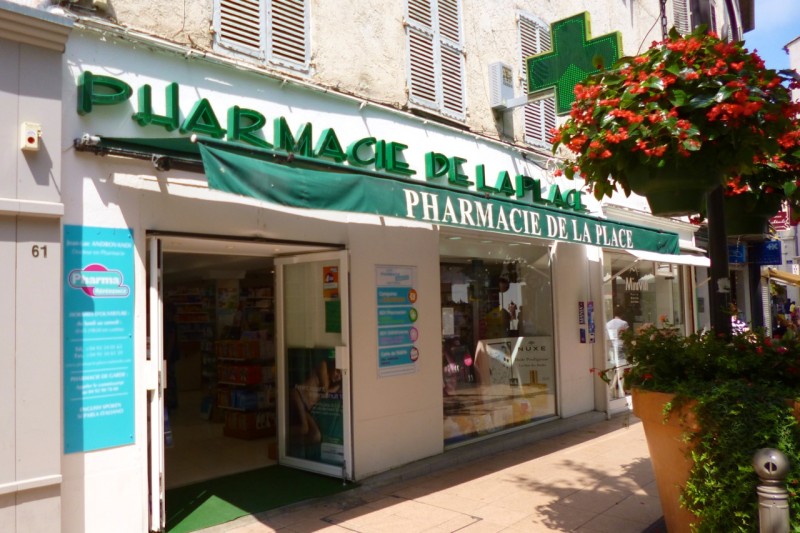
I laughed so much reading this!!! Made me miss antibes being in a very organized part of the world and oh so different to France, Sweden.
Bienvenue à French Lessons, Marika! And let me guess, the WiFi works perfectly up in Sweden, too?
Pharmacies are ubiquitous in France. Not only is there one on practically every corner but there are two kinds of them: pharmacies, drug stores and pharmacies with all kinds of beauty products that French love so much and sometimes skip lunch to buy a new “miracle cream”.